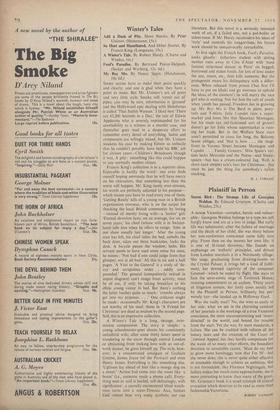Winter's Tales
Add a Dash of Pity. Short Stories. By Peter Ustinov. (Heinemann, 15s.) Fool's Paradise. By Bertrand Poirot-Delpech. (Seeker and Warburg, 12s. 6d.)
Slim- stories have to make their point quickly and clearly; and one is glad when they have a point to make. But Mr. Ustinov's are all point and very little style. Smoke will 'vomit out of pipes, you may be sure, information is 'gleaned' and the Hollywood epic dealing with Holofernes is called 'That Judith Woman.' 1 liked best 'There are 43,200 Seconds in a Day,' the tale of Edwin Applecote who is severely reprimanded for his unreliability as a witness in a murder case, and thereafter goes mad in a desperate effort to remember every detail of everything. Satire and compassion are tellingly mixed, but Mr. Ustinov weakens his case by making Edwin so imbecile that he couldn't possibly have held his BBC job for sixteen years—Children's Broadcasts though it was. A pity : something like this could happen to any normally modest citizen.
Francis King's collection is in a superior class. Enjoyable is hardly the word : one even finds oneself hoping nervously that he will have mercy on his characters, that something less than the worst will happen. Mr. King rarely over-stresses, his words are perfectly adjusted to his purpose— which means you have to read every one of them. 'Getting Ready' tells of a young man in a British organisation overseas, who is on the carpet for shocking the local British community by loving —instead of merely living with—a 'native' girl. `Eternal devotion lasts, on an average, for six or seven years,' his chief (whose wife is in Switzer- land) tells him when he offers to resign. 'Jobs in our show usually last longer.' After the young man has left, his chief tidies the bed, unbolts the back door, takes out three banknotes, locks the desk. A bicycle passes the window, halts. His servant seems to have used some sense for once, he muses: 'Not bad if one could judge from that glimpse; not at all bad.' All this in six and a half pages. 'A Visit to the General' is a study of 'de-. cay and scrupulous order . . . oddly com- pounded.' The general (compulsorily retired in unjust disgrace) can't resign from activity, must be of use, if only by taking breakfast to his effete young visitor in bed. But there's nothing the latter loathes quite so much: 'crumbs always get into my pyjamas. . . . One criticism might be made: occasionally Mr. King's characters are not worthy of his steel; those in 'A Friend for Christmas' are dead as mutton by the second page. Still, this is an impressive collection.
A Winter's Tale is a long, strange, over- intense composition. The story is simple: a young schoolmaster-poet shoots his consistently unfaithful wife; after some thirty hours spent in wandering in the snow through central London or abstaining from making love with an out-of- work dancer, he gives himself up. The style, how- ever, is a concentrated amalgam of Graham Greene, James Joyce (of the Portrait) and even Henry James. Everything is like something else. 'Ugliness lay ahead of him like a mangy dog on a street: `Action had come into the room like a boxer' (i.e., someone made a phone call). Every- thing seen or said is loaded, self-defeatingly, with significance: ,a casually encountered blind watch- man turns into a super-Tiresias. Alas, human kind cannot bear very many symbols; nor can literature. But this novel is a seriously intended work of art, if a failed one, not a pot-boiler or talent-tease. If Mr. Hardy reconsiders his ideas of `style' and controls his imagorrhcea, his future work should be unequivocally remarkable.
At first sight the French book, Fool's Paradise, looks ghastly : fatherless student with doting mother runs away to Cote d'Azur with 'most famous strip-tease dancer in Paris' On begged, borrowed and stolen funds, for lots of love under the sun, moon, etc., then kills someone. But the protagonist wears his delinquency with a differ- ence. When released from prison (`but first I'll have to put on khaki and go overseas to uphold the ideas of the moment') he will marry the nice girl who is waiting. Not for him the cult of youth when youth has passed. Freedom lies in growing up. My Boy Mo is The Bard in jeans, pony- tails and T-shirts. Julie Capulet runs a super-; market and loves Mo (for Maurice) Montague, but his mum (an old-fashioned sort of grocer) doesn't go for Julie whose supermarket is ruin- ing her trade. But in the Welfare State stars aren't permitted to cross for long, the Balcony Scene obliges, and 'that is how . . . the shop- front in Verona Street became Montague and Capulet . . . Family Grocers.' Miss Spain's ver- sion lacks Mercutio and the Nurse—and Shake- speare—but has a cream-coloured Jag. Well, a short (and simple) tales best for Christmas: this must be just the thing for somebody's nylon stocking.
D. J. EN10(


























































 Previous page
Previous page